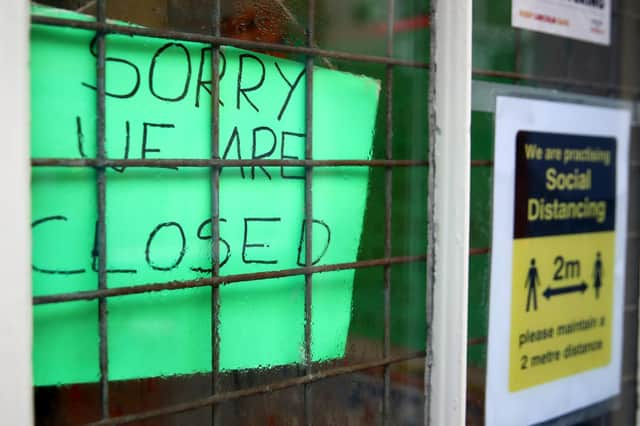'Tip of a very large iceberg' as 33,000 Scottish businesses show signs of distress


The figure is a 30 per cent increase compared with the same period the previous year and comes as the country faces a strict lockdown which is likely to remain in place until at least the middle of February.
The data, published by business rescue and recovery specialist Begbies Traynor, shows that the sharp rise in businesses showing “significant” distress was reflected across the rest of the UK.
Advertisement
Hide AdAdvertisement
Hide AdThis type of distress, which indicates early signs of financial problems, rose by 27 per cent across the UK as a whole in the final quarter of 2020 compared with the same period in 2019, affecting a total of 630,000 firms.
Scottish firms also saw a deteriorating picture quarter on quarter, with a 14 per cent rise in those seeing significant distress since the third quarter, slightly above the UK wide figure of a 13 per cent increase.
In contrast, Scotland experienced a 40 per cent fall in businesses experiencing “critical” distress, which refers to firms that have had winding up petitions or decrees totalling more than £5,000 against them, by the end of the fourth quarter compared with a year earlier. There was also a 19 per cent fall in these advanced signs of distress in Scotland quarter on quarter.
However, restructuring experts at Begbies said it was likely that those figures were the “tip of a very large iceberg”. The pandemic has reduced court activity limiting the number of decrees and winding up petitions being issued against indebted companies and there has been a ban on winding up petitions for Covid-related debts.
Ken Pattullo, managing partner for Begbies Traynor in Scotland, said: “It is extremely worrying to see such a huge rise in signs of early distress with so many Scottish companies struggling in the face of a continued fall-off in trade after nine months of almost constant Covid restrictions.
“While instances of more advanced signs of distress have actually fallen, this is probably due to the Government’s insolvency prevention measures which, together with pandemic-related financial aid, are masking the true picture.
“We fear that the latest research indicates escalating distress with more economic problems being stored up for further down the line, once these support measures are withdrawn.”
Every one of the 22 sectors in Scotland monitored by the “Red Flag Alert” research experienced double-digit increases in significant distress levels in the final quarter of 2020 compared with a year earlier – described as a “worrying sign” for the economy as the financial situation worsened for many companies.
Advertisement
Hide AdAdvertisement
Hide AdThe country’s all-important financial services sector was particularly badly hit with a 47 per cent year-on-year and 26 per cent quarter-on-quarter increase in significant distress as the effect of the pandemic bites, along with ongoing uncertainty around equivalence.
Despite the booming residential property market, the whole real estate and property sector – a key indicator of the economy’s performance – has seen significant distress rise by 35 per cent in the last quarter.
A message from the Editor:
Thank you for reading this article. We’re more reliant on your support than ever as the shift in consumer habits brought about by coronavirus impacts our advertisers. If you haven’t already, please consider supporting our trusted, fact-checked journalism by taking out a digital subscription: www.scotsman.com/subscriptions
Comments
Want to join the conversation? Please or to comment on this article.
